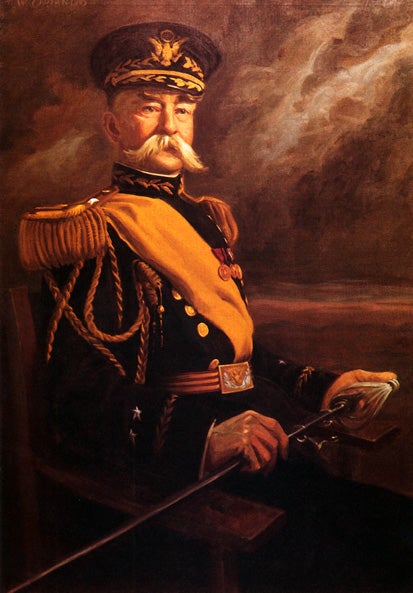- Major General
- Honorary & Indian Wars
Biography
Major General William W. Wotherspoon was inducted as an “Honorary Member” into the University of Rhode Island Army ROTC Hall of Fame in 1999.
Major General William W. Wotherspoon was born in Washington D.C. on 16 November 1850 and was educated in private schools. He served aboard ship as a mate in the United States Navy for three years. In October 1873, he was commissioned a Second Lieutenant of Infantry and assigned to the 12th Infantry Regiment. He served in the West during the Indian wars as a troop officer and quartermaster.
After a year of absence from the Army due to an illness, he became the Superintendent of the Soldiers’ Home in Washington, D.C. and did much needed work to expand it. He then served at Fort Sully and at Mount Vernon Barracks, where he trained a company of Apache prisoners from 1890 to 1894. In 1894, he became the aide to General Oliver O. Howard, Commander of the Department of the East; and then Captain Wotherspoon became the University of Rhode Island’s first Professor of Military Science and Tactics from 1894 to 1898.
In 1901, he was promoted to Major and transferred to the 30th Infantry. He commanded the 2nd Battalion, 6th Infantry at Fort Leavenworth, Kansas and then taught at the Command and General Staff College from 1902 to 1904. He was promoted to Lieutenant Colonel in 1904 and assigned to the 14th Infantry. He later was transferred to the 19th Infantry and became the Director of the U.S. Army War College from 1904 to 1906. He served as the Acting President of the Army War College and Chief of the Third Division, General Staff in 1907 and was promoted to Brigadier General in October 1907.
He then became President of the Army War College, serving from 1907 to 1909 and again from 1910 to 1912. Brigadier General Wotherspoon was instrumental in transforming the Army War College from an adjunct of the General Staff to an autonomous educational institution. He was promoted to Major General in May 1912 and served as the Commander of the Department of the Gulf until that September.
Major General Wotherspoon became the Chief of Staff of the United States Army from 21 April to 15 November 1914 and called attention to shortages of officers and noncommissioned officers for Army missions, emphasized the need to reevaluate coast defenses to meet heavier-gunned battleships and was instrumental in overseeing the establishment of an aviation section in the Signal Corps and the completion of the Panama Canal.
Major General Wotherspoon retired from active service on 16 November 1914 and later was the New York State Superintendent of Public Works from 1915 – 1920. Though not a member of the URI Army ROTC program, Major General Wotherspoon was elected to its Hall of Fame as a Faculty member who gave considerably of his time and resources to the betterment of the ROTC program at the University of Rhode Island. Major General Wotherspoon’s heroism in combat and leadership is in the finest traditions of the military and reflects great credit upon himself, his family and the University of Rhode Island.
Major General William Wotherspoon died in Washington, D.C. on 21 October 1921. He was buried with full military honors at Arlington National Cemetery, Arlington, Virginia.

